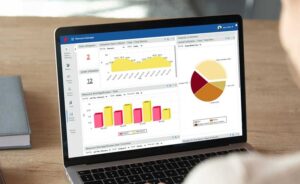I. Introduction
Real-time business intelligence (RTBI) is the process of gathering, analyzing, and presenting data in real-time to support decision-making. It enables organizations to gain insights into their operations, identify areas for improvement, and make informed decisions quickly. In today’s data-driven business environment, real-time business intelligence has become increasingly important to achieve success.

Data is critical to business success. Without data, it’s impossible to measure performance, identify trends, and make informed decisions. Over the years, businesses have invested in various technologies to collect and analyze data, and business intelligence (BI) has emerged as a popular approach to managing data. BI involves the use of tools, technologies, and processes to gather, analyze, and present data to support decision-making.
II. The Benefits of Real-Time Business Intelligence
RTBI offers several benefits to businesses that can help them improve their efficiency and productivity. Here are some of the advantages of RTBI:
Improved decision-making process
RTBI enables decision-makers to access real-time data, which is crucial for making informed decisions. Real-time data helps businesses to identify opportunities and threats quickly and respond accordingly. With RTBI, decision-makers can access data from multiple sources, analyze it, and make informed decisions quickly.
Enhanced business agility
RTBI enables businesses to respond quickly to changing market conditions, customer needs, and competitive threats. Real-time data enables businesses to identify trends and patterns, enabling them to make changes in their operations quickly. This agility can help businesses gain a competitive advantage and improve their bottom line.
Increased operational efficiency
RTBI can help businesses improve their operational efficiency by providing real-time visibility into their operations. Real-time data can help identify inefficiencies and bottlenecks, enabling businesses to make changes to improve their operations. This increased efficiency can help businesses reduce costs, improve customer satisfaction, and increase profitability.
Better customer experience
RTBI enables businesses to provide a better customer experience by providing real-time insights into customer behavior and preferences. Real-time data can help businesses personalize their offerings, improve customer service, and identify opportunities to upsell or cross-sell products and services.
Improved risk management
RTBI can help businesses identify and mitigate risks quickly. Real-time data can help identify potential risks and threats, enabling businesses to take proactive measures to mitigate them. This can help businesses reduce the impact of risks and improve their resilience.
III. Real-Time Business Intelligence Technologies
Several technologies support RTBI. Here are some of the key technologies that enable RTBI:
In-memory computing
In-memory computing is a technology that enables data to be stored and processed in memory instead of on disk. This technology enables real-time data processing and analysis, enabling businesses to gain insights quickly.
Cloud computing
Cloud computing is a technology that enables businesses to access computing resources, such as servers and storage, from remote servers over the internet. Cloud computing enables businesses to scale up or down their computing resources as needed, making it an ideal solution for real-time data processing.
Big Data
Big Data refers to the large and complex data sets that businesses generate. Big Data technologies enable businesses to collect, store, and analyze vast amounts of data in real-time, making it an essential technology for RTBI.
Artificial Intelligence and Machine Learning
Artificial Intelligence (AI) and Machine Learning (ML) are technologies that enable computers to learn and make decisions based on data. These technologies are increasingly being used in RTBI to automate decision-making processes, identify patterns, and predict outcomes.
IV. Real-Time Business Intelligence Applications
RTBI has several applications across various business functions. Here are some of the key applications of RTBI:
Sales and marketing
RTBI can help businesses to identify market trends, monitor competitor activities, and personalize offerings based on customer behavior.
Supply chain management
RTBI can help businesses to optimize their supply chain operations by providing real-time visibility into inventory levels, logistics, and demand.
Financial reporting
RTBI can help businesses to improve their financial reporting by providing real-time insights into financial data, enabling businesses to make informed decisions quickly.
Customer service
RTBI can help businesses to improve customer service by providing real-time insights into customer behavior, enabling businesses to provide personalized support and identify opportunities for upselling or cross-selling.
Human resources
RTBI can help businesses to optimize their human resource operations by providing real-time insights into employee performance, engagement, and retention.
V. Challenges and Limitations of Real-Time Business Intelligence
Despite the benefits of RTBI, there are several challenges and limitations that businesses must consider. Here are some of the key challenges and limitations:
Cost of implementation
Implementing RTBI can be costly, especially for smaller businesses with limited resources. Businesses must consider the cost of hardware, software, and personnel when implementing RTBI.
Data quality and consistency
RTBI relies on real-time data, which can be prone to errors and inconsistencies. Businesses must ensure that their data is accurate, consistent, and reliable.
Data security and privacy
RTBI involves the collection and processing of sensitive data, which can be vulnerable to cyber attacks and breaches. Businesses must ensure that their data is secure and comply with data privacy regulations.
Lack of skilled personnel
RTBI requires skilled personnel with expertise in data analysis, software development, and machine learning. Businesses may struggle to find and retain personnel with these skills.
VI. Conclusion
RTBI offers several benefits to businesses that can help them improve their efficiency, productivity, and bottom line. By enabling businesses to make informed decisions quickly, RTBI can help businesses gain a competitive advantage and stay ahead of the curve. While there are several challenges and limitations to implementing RTBI, businesses can overcome them by investing in the right technologies and personnel. The future of RTBI looks promising, and businesses that invest in it now are likely to reap the rewards in the years to come.
FAQ
Q: What is real-time business intelligence?
A: Real-time business intelligence (RTBI) is the process of gathering, analyzing, and presenting data in real-time to support decision-making.
Q: What are the benefits of real-time business intelligence?
A: The benefits of RTBI include improved decision-making, enhanced business agility, increased operational efficiency, better customer experience, and improved risk management.
Q: What technologies support real-time business intelligence?
A: Technologies that support RTBI include in-memory computing, cloud computing, big data, and artificial intelligence and machine learning.
Q: What are the applications of real-time business intelligence?
A: The applications of RTBI include sales and marketing, supply chain management, financial reporting, customer service, and human resources.
Q: What are the challenges and limitations of real-time business intelligence?
A: The challenges and limitations of RTBI include the cost of implementation, data quality and consistency, data security and privacy, and the lack of skilled personnel.
Q: How can businesses overcome the challenges of implementing real-time business intelligence?
A: Businesses can overcome the challenges of implementing RTBI by investing in the right technologies and personnel and ensuring that their data is accurate, secure, and compliant with data privacy regulations.
